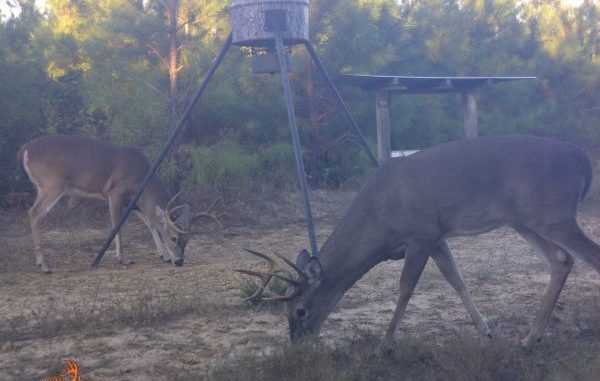
Former game warden shares tips on being a courteous hunter
Summer is winding down and we are once again preparing for hunting season. A lot of work gets done during late summer and early fall as we prepare for cooler weather and good times in the woods.
It is an important time of anticipation and preparation directed toward the days when we can focus solely on the hunt and maybe enjoy a little escape from work and the worry of everyday life.
During the last several years on the job, I noticed an increase in conflicts between hunters and neighboring landowners or hunters on adjoining property. More and more, wildlife enforcement agents were (and still are) being called upon to fix these problems — many of which are not violations of the law and thus not something an agent can remedy.
Such conflicts arise as the result of a variety of reasons, and most could have been avoided in the first place if the parties involved had used a little forethought and consideration.
Let’s take a look at a few common hunting-related conflicts and ways to resolve them or, better yet, avoid them altogether.
One of the most-common beefs is about deer stand locations. Without a doubt, as populations increase, suburbs continue to spread and homes are built on land that just a year or two ago was wooded or agricultural property.
I recall one new homeowner who had moved to the country for a safer environment with a big backyard for his children. A deer stand stood on adjoining property and was visible from his home.
As soon as he realized what it was and that a hunter armed with a rifle would be sitting in it, he was on the phone to the Louisiana Department of Wildlife and Fisheries demanding we come out and make the hunter remove the stand.
We could not, of course, do that because the hunter had done nothing wrong.
The best the responding agent could do was to try and educate the homeowner about hunting and put him in contact with the owner of the adjoining property to see if they could work things out.
Another big deer-stand conflict is between hunters on adjoining property with stands too close to the property line.
Some of those situations get really nasty, with accusations of shooting game across the fence or property line and attempts to sabotage each others hunting spots.
The situation can be downright dangerous, too, and at least one accidental shooting in recent years took place when a deer walked out between two stands on different hunting leases. One hunter fired at the deer and missed, but the bullet went on downrange and hit the hunter in the other stand in the arm.
Fortunately it was not a life threatening injury.
I have been told that some parishes in Louisiana and counties in other states have ordinances with minimum distances for stand placement in relation to property lines. But Louisiana has no statewide law addressing this, so the parties involved must come to terms themselves, unless a local law applies.
I do know of at least one timber company enforcing a “gentlemen’s agreement” on land leased to hunters. Parties leasing from this company must agree that no stands can be placed within 70 yards of property lines, and it seems to work well for all involved.
Deer stands near public roads invite problems and controversy, too. Yes, the stand might be out of the road right-of-way and on private land, but if it is too near the road you can bet someone will complain — and it throws a bad light on hunters and hunting.
Different landowners or leaseholders forced to share a common road will often end up in conflict as a result of inconsiderate conduct.
In one such situation, hunters leasing from one timber company had to drive through another timber company’s land leased by other hunters. Things went along just fine until some of the hunters and their guests on the interior property began driving through the other lease during prime morning and evening hunting hours.
On several occasions, opportunities on both deer and turkeys were lost due to vehicles going through the property at just the wrong time.
Even worse was another situation where two groups shared a road going through their leases. Both leases were fairly small, and one group had been hunting the property for several years.
The later group kept noise and movement to a minimum to avoid alerting the bucks found in this prime area.
All was good until the second group came in: They apparently loved mud riding in their large, loud 4×4 trucks as much or more than hunting, and could be heard throughout the day and night roaring around the property whooping and yelling.
They lost the lease after only two seasons, probably due in large part to their conduct. With a little polite consideration for the other hunters they might still be hunting that land.
Wildlife agents also receive a surprising number of reports regarding improper disposal of heads, hides and entrails from harvested game. In many cases, it is illegal dumping, and offenders are subject to prosecution.
However, we all know the chances of getting caught or slim.
In other cases, where the unwanted parts are disposed of on private land, it might be legal but visible to the public and just plain offensive.
All hunters would do well to dispose of offal properly, avoiding places where it’s visible to the non-hunting public.
So as we go about preparing for another hunting season, keep in mind that it will be a lot more fun if we avoid conflict.
Place deer stands out of sight of adjoining landowners, if possible. When hunting near homes or properties where hunting is frowned upon, consider bow hunting only.
Be considerate of other hunters, as well — particularly when sharing roads, trails or common campsites. Communicate with neighboring hunters and landowners, and find out if anything you or someone else hunting with you might be doing that bothers them.
Make reasonable concessions to keep the peace.
As has been said before, the majority of people in today’s society don’t hunt. But they have no objection to hunting, and we certainly don’t want to give them a reason to object.
And hunters certainly need to avoid conflict with each other and with landowners.
So be a good neighbor and a good hunter, and get the season off to a pleasant start.




